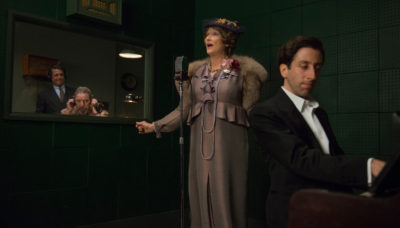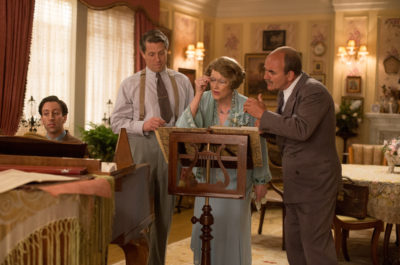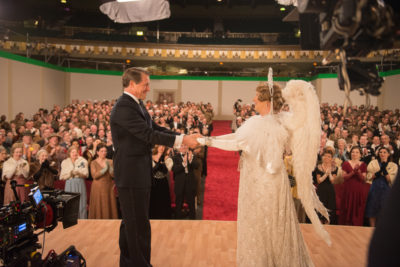
(L-R) Hugh Grant as St Clair Bayfield, Meryl Streep as Florence Foster Jenkins and Simon Helberg as Cosme McMoon in FLORENCE FOSTER JENKINS by Paramount Pictures, Pathé, BBC Films and eOne
Florence Foster Jenkins is a film that is based on the last few months of the title character’s life. Jenkins was a fierce music lover – she supported the music scene in New York and eventually decided that she had to sing.
It was not the smartest move she could have made – she is considered to be one of the all-time worst singers.
We’re introduced to Florence (Meryl Streep) as she takes part in a series of tableaux in the Verdi Club (which she founded) – tableaux that illustrated various pieces of music (The Ride of the Valkyries, for example). Her husband, St. Clair Bayfield (Hugh Grant), seems to dote on her every word.
After the show, they return home, where he puts her to bed and recites some Shakespeare to lull her to sleep – whereupon a transformation takes place. Bayfield and their maid, Kitty (Brid Brennan), remove her wig and replace it with a turban – Bayfield removes her lashes, as well. Clearly, Florence is not well.
When she decides to perform, herself, Bayfield auditions pianists – Cosmé McMoon (Simon Helberg, The Big Bang Theory) plays gently but beautifully and she likes him, so he’s hired.

Simon Helberg as Cosme McMoon, Hugh Grant as St Clair Bayfield, Meryl Streep as Florence Foster Jenkins and David Haig as Carlo Edwards in FLORENCE FOSTER JENKINS by Paramount Pictures, Pathé, BBC Films and eOne
His reactions to her singing during their first practice session reflect those of the audience – except, perhaps, for the volume of our laughter. Still, he carries on at Bayfield’s urging – though even her singing teacher lets his exasperation show when he’s out of the room – by letting Bayfield know that his instructing her should be kept a solemn secret.
There still remain little mysteries – what’s wrong with her; what’s in the briefcase she always carries (McMoon is told never to mention it and never to inquire as to its contents).
Before long, Florence is giving recitals – carefully vetted by Bayfield so that only dear friends and nearly deaf people – and critics who can be bought – are in attendance.
It’s not nearly enough for Florence who cuts a record to give to her friends – then decides she’s going to perform at Carnegie Hall – which sends McMoon into near hysterics.
There’s a scene where Florence visits her pianist in his shabby home – to give him a copy of the recording – and the ensuing conversation gives us the answer to one of the film’s two mysteries (not the briefcase – that comes later).
That conversation and a plea for loyalty from Bayfield persuade McMoon to play Carnegie Hall with Florence.

Meryl Streep (center) as Florence Foster Jenkins and Hugh Grant (right) as St Clair Bayfield in FLORENCE FOSTER JENKINS, by Paramount Pictures, Pathé, BBC Films and eOne
That conversation also explains why Bayfield, has a separate apartment that he shares with a much younger woman (Rebecca Ferguson) – an important detail because we could easily just assume that he married Florence for her money. Maybe he did, but somewhere along the way, he came to love her – to the point that he will defend her against mockery. Her honor is important to him.
Florence Foster Jenkins is a gentle film about a woman who would not be discouraged and, through pure force of will lived to be seventy when her life expectancy should have been far, far less – and who wouldn’t let a little thing like being completely unable to sing keep her from singing at Carnegie Hall.
The film counterbalances her confidence in her vocal talents by also showing us that in virtually every other way, she was a terrific person: her love and support for the music scene; her friendships with some of the greats (like Arturo Toscanini); her love of potato salad (providing bathtubs of the stuff for ladies’ luncheons; her complete besottedness over her husband, and the affection she shows for McMoon as a just a few examples.
Although the script isn’t quite the gem it could have been (there’s some clunky exposition, for example), it never treats Florence as anything but a good-hearted woman who did what she could – and a few times, what she couldn’t.

(L-R) Hugh Grant as St Clair Bayfield and Meryl Streep as Florence Foster Jenkins in FLORENCE FOSTER JENKINS, by Paramount Pictures, Pathé, BBC Films and eOne
Director Stephen Frears never quite lets the film descend into farce – though it would have been easy to do so. Instead, he lets us get to know Florence long before we hear her sing. By that time, we are on her side and our laughter isn’t quite as cruel as it might otherwise be.
Streep is not at all over the top as Florence, though again, it would have been easy to go there. She does get Florence’s self-confidence and deep love of music and delivers it to us with the same deep sincerity that Florence shows in the film – though it is true that we get one fantasy sequence in which she is allowed to sing one song properly, as if director Frears was reminding us that it’s hard to sing that badly deliberately.
Grant hasn’t been so good ages. As Bayfield, he seems to be having as fun as the audience – and he also seems to be doing it at the expense of his younger self. He makes Bayfield’s love for his bunny rabbit as real as her love for him – and given his side arrangement, that’s a huge task.
Helberg, though, steals every scene he’s in. His reactions to Florence’s vocal talents set up his reaction to just after the Carnegie Hall concert – which is similar but for a completely different reason. He has completely been taken by Florence and Bayfield.
Florence Foster Jenkins is a lovely gentle film that has no particular axe to grind, which makes it almost unique – and definitely makes it worth seeing.
Final Grade: A-